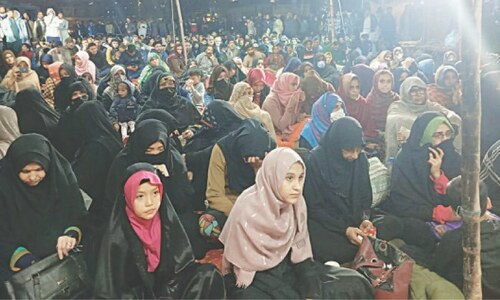KARACHI: Sifting fact from fiction in the digital age, changing algorithms, start-up investments and hiring for growth within the start-up environment were some of the things on the minds of experts during the two-day innovation conference titled ‘+92Disrupt’ organised by Katalyst Labs, which concluded at a local hotel here on Sunday.
Using the right words on the internet, misinformation and the difficulties in sifting fact from fiction in the digital age were topics of a discussion moderated by Jahanzaib Haque. Panellists Amber Rahim Shamsi, Arafat Mazhar, Farieha Aziz, Shaheryar Popalzai and Zarrar Khuhro took part in the discussion and looked at aspects of fake news and the people who spread it.
Arafat Mazhar, founder of Puffball Studios, said: “If you didn’t like someone, you might target them by posting that they are Qadiani or something on social media to then just sit back and see what follows.”
“Recently, the controversy over the Transgender Persons Act and the introduction of the letter ‘X’ for the transgender community in national identity cards also revolved around gender transition and how some 32,000 persons had changed their gender from ‘M’ to ‘F’ with Nadra all thanks to the bill. And the transgender community faced much hate after that information came out.
Participants say it’s okay to fail because we learn from failures
“Then a Nadra spokesperson explained that the change from male to female and vice versa in the Nadra databank was not because people were changing their genders, but because the persons entering their data initially had made a mistake pressing the wrong key on the keyboard, which the people were coming back to get corrected,” he pointed out.
“When you passionately love or hate something and someone posts anything which is untrue about someone but which you want to agree with because you don’t like that person anyway, you also get a high from it and re-post the post or add more and more to it. Your body releases dopamine and you feel validated,” explained Zarrar Khuhro, co-host of the talk show Zara Hat Kay.
Explaining the difference between ‘misinformation’, which is misleading or incorrect information, and ‘disinformation’, which is deliberately deceptive information, Amber Rahim Shamsi, director, Centre for Excellence in Journalism at IBA, said that there was no stop to such kind of deliberate spread of fake news, because it had to do with human psychology.
“We have been establishing fact-checking desks, but are unable to tackle the problem,” she said, adding that there were very clean divides here with even television news channels taking sides and spreading disinformation if they were for or against any political parties.
“Then the political parties, too, have their own interests, calling journalists who may not toe their line, and ‘lifafa journalists’, etc,” she said.
“Here when you discredit someone, then you can’t fix it,” said journalist and trainer Farieha Aziz. “Fake news is also a term adopted to discredit any news,” she added.
Shaheryar Popalzai, head of MarCom, PureVPN (Gaditeck), said that people should have the right eye to catch or identify fake news because these days the culprits spreading disinformation are always a step ahead of technology.
Another very interesting panel discussion was the one about capturing a distracted generation, about how content creators keep up with changing algorithms and come up with new ideas along with managing to maintain a work-life balance.
Podcast host Kazi Akber said that society did not have much time to give as they like shortcuts. “But conversations can’t be brief. So podcast consumers are the friendliest while TikTok consumers not so much friendly,” he said.
Illustrator and animator Areeba Siddique said that her following was based on Instagram. “It’s been a long journey with a lot of experimenting,” she said, adding that she felt more comfortable speaking through her art on social media instead of putting herself out there. “I want to put myself out there as an artist,” she said.
Bilal Hassan, who besides being a content creator, is also a travel and culture writer and a doctor, said that one could make a decent amount of money on social media, even more so that from the profession of a doctor or engineer. “So embrace being a content creator. You have something in your head. Get it out,” he said.
The panel discussion about start-up investment showed how Pakistan’s start-up potential is gaining speed.
The biggest takeaway from the discussion, moderated by journalist Faseeh Mangi, was that it is okay to fail because people also learn from failures.
Yet another panel discussion, panellists discussed how to build a dream team and tips on improving company culture and hiring for growth within the start-up environment.
The discussion concluded on the note that no one wants to work with non-technical people so it is wiser to first hire someone senior and then hire more people according to that senior person’s requirement.
“Otherwise, when opening an office and conducting interviews you meet young people who look interested, but never come to you. Some even thought that we were human traffickers just because we were not technical people ourselves,” said Meenah Tariq, CEO and co-founder of Metric.
To that Yasir Memon, co-founder of Jugnu and Salesflo, added: “People at first thought we were into some kind of banking scam, even the parents of the people we interviewed were sceptical. But the first person we hired, we sent for training to Singapore and now he heads one of our sections. So hunt for that passion, that missionary who will carry your start-up forward.
Published in Dawn, October 24th, 2022















































Dear visitor, the comments section is undergoing an overhaul and will return soon.